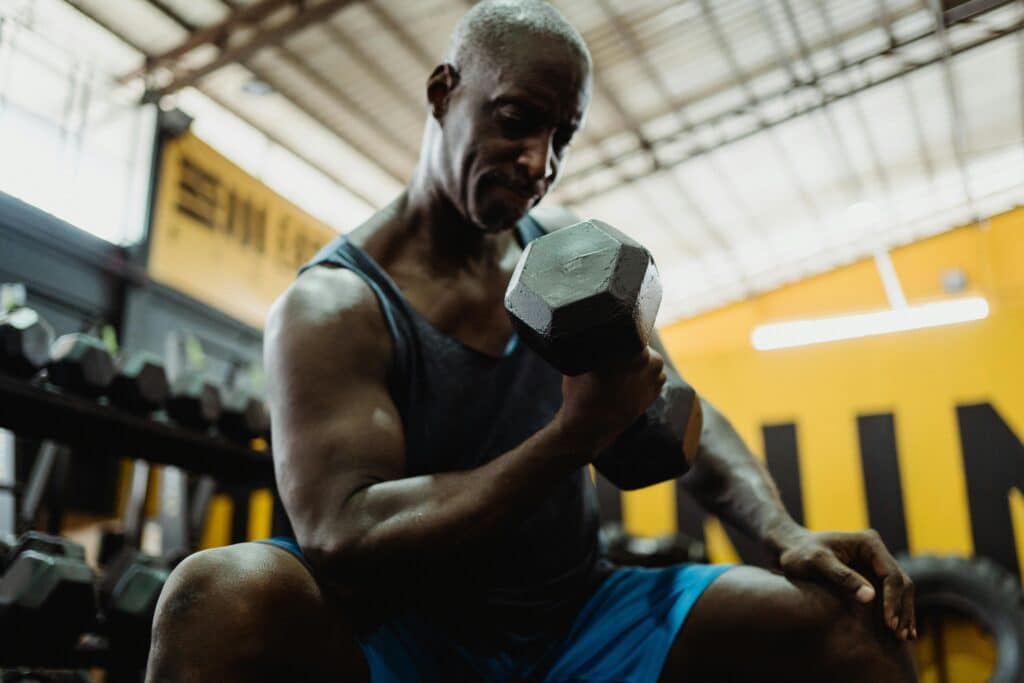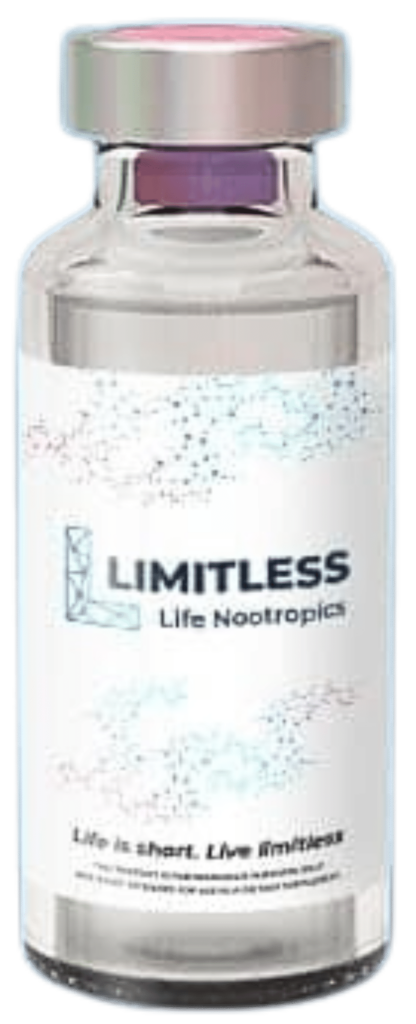Looking to maximize your muscle growth and beef up those muscles in record time?
If you’ve been hitting the gym hard with four days of intense two-hour workouts but are still not seeing the gains, you’re likely on the hunt for the absolute best ways to pack on muscle mass quickly.
Peptides and steroids are two popular options most bodybuilders usually think of, each with their own benefits and risks.
The question is: which one can safely provide you with the best results?
This article dives deep into comparing peptides vs. steroids to help you make smart choices that actually lead to you achieving your fitness goals.
Table of Contents
ToggleWhat Are Peptides?

Peptides are short chains of amino acids that are referred to as the building blocks of proteins.
They are usually made up of 2-50 amino acids with a linear configuration, are much shorter than proteins, and do not create complex three-dimensional structures.
They occur naturally within the body but can also be synthesized artificially, and they play important roles in many physiological processes such as appetite regulation, hormone production, tissue growth, immune response, and cellular motility.
At the moment, more than 60 peptide-based products are approved by the FDA for human use.
Hundreds more are still in the process of investigation and approval.
Keep in mind some peptides are also categorized by the World Anti-Doping Agency (WADA) as “unapproved for human use” (SO) or “peptide hormone and growth factors” (S2).
This means you may not want to use them if you are a competitive athlete who is frequently subjected to drug testing.
How Do Peptides Work?
Peptides work by interacting with specific receptors and thereby influencing different biological processes in the body.
This includes:
- Stimulating the release of growth hormone, which boosts athletic performance
- Quickening muscle repair and recovery time
- Promoting collagen synthesis, which offers anti-aging benefits
- Increasing lipolysis for fat loss.
What Are Steroids?

Steroids are synthetic substances that work by mimicking the effects of testosterone.
In terms of their chemical structure, they are organic compounds made with four fused carbon rings with functional group attachments.
There are two types of steroids: anabolic steroids and corticosteroids.
Anabolic steroids help promote muscle growth and boost athletic performance, while corticosteroids are mainly used as anti-inflammatory agents.
Anabolic steroids are classified as a Schedule 3 controlled substance by the U.S. government, so you can only purchase them with a valid medical prescription.
Moreover, they are banned for use by athletes by the World Anti-Doping Agency (WADA).
They are classified as S1 class, which are prohibited in and out of any sports competition.
How Do Steroids Work?
Athletes and bodybuilders often use steroids to get ready for competitions and gain a competitive edge.
They work by binding to androgen receptors in the body, which then affects gene expression and protein synthesis.
This results in accelerated muscle growth, enhanced endurance, increased strength, and faster recovery times in bodybuilders.
(NOTE: If you want an extremely detailed and honest examination of anabolic steroids, I highly recommend you read Chapter 19 of The TOT Bible)
The Difference Between Peptides vs Steroids

Both peptides and steroids help with muscle growth and building.
However, they have different mechanisms, side effects, and uses.
Mechanism of Action
Peptides interact and bind with specific receptors, setting off a chain reaction of biological responses.
Steroids, on the other hand, directly influence how genes are expressed and how proteins are made.
Results and Effects
Peptides offer more gradual and lasting benefits, which can lead to long-term changes in body composition.
How fast you see improvements in your muscle growth depends on different factors such as dosage, body type, and workout routine.
Most of the time, you can see the results within a few weeks to a few months.
Steroids, on the other hand, can bring about faster results far more noticeably.
They also allow you to train more frequently for longer periods of time, while also speeding up recovery in between workouts.
Steroids can even boost your muscle growth potential way beyond what your genes would naturally allow… but this can carry a higher risk of unwanted side effects.
Side Effects
Peptides typically have fewer side effects than steroids.
Common side effects of using peptides are nausea, vomiting, and headaches.
Misuse of peptides can also lead to health issues such as skeletal muscle damage, motor paralysis, osteoporosis, and hypertension.
Steroids, especially when taken in high doses (supraphysiologic) or for a long time, can lead to a variety of side effects, some of which can be serious and long-lasting.
Legality and Regulation
Peptides and steroids are regulated differently depending on where you are.
Generally, some peptides can be legally prescribed by a doctor.
Others are still in the process of investigation and approval and can be bought for research purposes only.
(As stated earlier, peptides categorized by the World Anti-Doping Agency (WADA) as either unapproved for human use (SO) or peptide hormones and growth factors (S2)).
Steroids, on the other hand, are usually considered controlled substances. That means you can’t possess or sell them without a proper prescription.
Steroids are also banned for use by athletes by the World Anti-Doping Agency (WADA).
They are categorized under the S1 class, all of which are prohibited in and out of any sports competition.
Peptides vs. Steroids for Muscle Growth and Bodybuilding

Steroids and peptides both have muscle-building properties that can help improve your performance in the gym and enhance your overall physique.
These effects have been observed by a growing number of studies aiming to discover the benefits of steroids in muscle-building.
For instance, Brazilian researchers worked with men who were over 60 years old.
The results showed that those who were given physiological steroid doses gained 3.3 to 13.2 pounds in lean body mass after 3 months of consistent use compared to the placebo group:
“We included randomized placebo-controlled trials (RCT) that studied testosterone replacement therapy in men over 60 years of age, with total testosterone levels ≤550 ng/dl, observing gains in weight, lean mass tissue and fat mass as outcome.
We excluded duplicated studies, studies which mixed men and women, and studies using weak androgens such as dehydroepiandrosterone or androstenedione.
The initial search yielded 2681 articles, of which 26 were selected for full text analysis. In the end, 11 studies were included. However, 3 studies were not included in the meta-analysis.
Meta-analysis showed that mean weight increased (lean mass), ranging from 1.65 (95 % CI, 1.61–1.69) to 6.20 (95 % CI, 5.22–7.18) kg, although it was heterogeneous (I2 = 98 %).
Effect estimate was 3.59 [2.38–4.81].
Androgen therapy decreased fat mass; effect estimate was −1.78 [−2.57, −0.99] that analysis had also a high level of heterogeneity (I2 = 81 %).”
In another study in the New England Journal of Medicine, men who took supraphysiological steroid doses gained 13.2 pounds with exercise and 6.8 pounds without exercise after 10 weeks:
“We randomly assigned 43 normal men to one of four groups: placebo with no exercise, testosterone with no exercise, placebo plus exercise, and testosterone plus exercise.
The men received injections of 600 mg of testosterone enanthate or placebo weekly for 10 weeks.
The men in the exercise groups performed standardized weight-lifting exercises three times weekly.
Before and after the treatment period, fat-free mass was determined by underwater weighing, muscle size was measured by magnetic resonance imaging, and the strength of the arms and legs was assessed by bench-press and squatting exercises, respectively.
Among the men in the no-exercise groups, those given testosterone had greater increases than those given placebo in muscle size in their arms (mean [±SE] change in triceps area, 424±104 vs. -81±109 mm2; P<0.05) and legs (change in quadriceps area, 607±123 vs. -131±111 mm2; P<0.05) and greater increases in strength in the bench-press (9±4 vs. -1±1 kg, P<0.05) and squatting exercises (16±4 vs. 3±1 kg, P<0.05).
The men assigned to testosterone and exercise had greater increases in fat-free mass (6.1±0.6 kg) and muscle size (triceps area, 501±104 mm2; quadriceps area, 1174±91 mm2) than those assigned to either no-exercise group, and greater increases in muscle strength (bench-press strength, 22±2 kg; squatting-exercise capacity, 38±4 kg) than either no-exercise group.
Neither mood nor behavior was altered in any group.”
Steroids can also help men maintain and increase lean body mass even if they are on restricted low-calorie diets, according to eBioMedicine:
“We conducted a three-phase, proof-of-concept, single centre, randomised, double-blind, placebo-controlled trial of non-obese men: 14-d run-in, free-living, eucaloric diet phase; 28-d live-in, 55% exercise- and diet-induced energy deficit phase with (200 mg testosterone enanthate per week, Testosterone, n = 24) or without (Placebo, n = 26) exogenous testosterone; and 14-d recovery, free-living, ad libitum diet phase.
Body composition was the primary end point; secondary endpoints included lower-body muscle function and health-related biomarkers.
Following energy deficit, lean body mass increased in Testosterone and remained stable in Placebo, such that lean body mass significantly differed between groups [mean difference between groups (95% CI), 2.5 kg (3.3, 1.6); P < .0001].
Fat mass decreased similarly in both treatment groups [0.2 (-0.4, 0.7), P = 1]. Change in lean body mass was associated with change in total testosterone (r = 0.71, P < .0001).
Supplemental testosterone had no effect on lower-body muscle function or health-related biomarkers.”
Meanwhile, peptides have been shown to increase muscle size and lean body mass, though to a lesser extent.
Some of the peptides with muscle-building properties include sermorelin, CJC-1295, and MK-677.
Sermorelin helps boost the production of growth hormone and insulin-like growth factor 1 (IGF-1), both which are important in muscle growth and fat loss via stimulation of the pituitary gland.
In a study in the Journal of Growth Hormone & IGF Research, sermorelin treatment resulted in increased lean body mass:
“The impact of GH replacement therapy on bone mineral density (BMD) appears to be related to a large number of interrelated factors, including the dose and duration of therapy, timing of onset of GHD, skeletal site, degree of osteopenia at baseline, and age and gender of the patient.
Overall, the effect of GH replacement on BMD in the majority of patients is beneficial.
In comparison with normal individuals, GH-deficient individuals have reduced lean body mass and muscle strength, both of which increase within 12 months of GH therapy.
Therefore, the effects of GH replacement on muscle and bone in GH-deficient individuals are significant and beneficial, although the longer-term effects of GH replacement in terms of reducing the number of fractures and prevention of frailty in old age are not yet established.
The effects of GH on bone and muscle in GH-replete individuals have been studied less fully.
While GH therapy modulates markers of bone resorption and formation, its effects in patients with idiopathic osteoporosis are disappointing, with oestrogen therapy or bisphosphonates proving to be more effective in post-menopausal women.
To date, however, there have been no GH treatment trials of adequate duration (longer than 18 months), and it remains possible that longer-term trials may demonstrate more profound effects. T
The effects of GH therapy on muscle have been examined in normal elderly individuals. Generally, the doses used have been supraphysiological and associated with an unacceptable incidence of side effects.”
Similar to sermorelin, MK-677 (a.k.a. ibutamoren) is a growth hormone secretagogue that also helps boost growth hormone production and insulin-like growth factor 1 (IGF-1), thereby enhancing muscle growth and recovery.
The peptide is also used as an anabolic substance, which means it can help increase muscle mass and strength and accelerate fat loss.
As a result, it improves body composition and prevents muscle wasting related to old age and other medical conditions.
In a study published in The Journal of Clinical Endocrinology and Metabolism, obese males who were given MK-677 for 2 months boosted their basal metabolic rate and observed increases in fat-free mass:
“Twenty-four obese males, aged 18–50 yr, with body mass indexes greater than 30 kg/m2 and waist/hip ratios greater than 0.95, were treated with MK-677 25 mg (n = 12) or placebo (n = 12) daily for 8 weeks.
Serum insulin-like growth factor I (IGF-I) increased approximately 40% with MK-677 treatment (P < 0.001 vs. placebo). Serum IGF-binding protein-3 was also significantly increased (P ≤ 0.001 vs. placebo).
GH and PRL (peak and area under the curve values) were significantly increased after the initial dose of MK-677.
Significant increases, with the exception of peak PRL, persisted at 2 and 8 weeks of treatment.
The increases in GH and PRL after the initial dose were significantly greater than the increase seen after multiple doses.
Serum and urinary concentrations of cortisol were not increased at 2 and 8 weeks (P = NS, vs. placebo).
Fat-free mass increased significantly in the MK-677 treatment group when determined with dual energy x-ray absorptiometry (P < 0.01) or using a four-compartment model (P < 0.05).
Total and visceral fat were not significantly changed with active therapy. The basal metabolic rate was significantly increased at 2 weeks of MK-677 treatment (P = 0.01) but not at 8 weeks (P = 0.1).
Fasting concentrations of glucose and insulin were unchanged, whereas an oral glucose tolerance test showed impairment of glucose homeostasis at 2 and 8 weeks.”
CJC-1295, a synthetic analog of growth hormone-releasing hormone (GHRH), is mainly used to boost blood levels of human growth hormone by up to ten times its normal capacity.
It can also increase serum growth hormone levels by 200-1000% for up to 6 days.
By stimulating the release of growth hormone (GH) from the pituitary gland, CJC-1295 helps increase strength and muscle mass.
It also promotes protein synthesis, muscle growth, and repair, making it one of the best peptides for muscle-building.
11 healthy adults who were given CJC-1295 for one week showed increased protein synthesis, enhancing their muscle mass and strength, as reported in the Journal of Growth Hormone & IGF Research:
“Sera from 11 healthy young adult men before and one week after CJC-1295 injection were analyzed by two-dimensional gel electrophoresis for proteomic changes.
Serum proteins displaying significant changes before and after treatment were subsequently identified using mass spectrometry.
In addition, correlations between these proteins and GH or IGF-1 levels were evaluated.
Two protein spots that displayed decreased intensities after treatment were identified as an apolipoprotein A1 isoform and a transthyretin isoform.
Three protein spots upregulated by CJC-1295 treatment included beta-hemoglobin, a C-terminal fragment of albumin, and a mix of an immunoglobulin fragment and another C-terminal albumin fragment.
A linear relationship was found between the spot containing immunoglobulin and albumin fragments and IGF-1 levels.”
Benefits of Peptides for Bodybuilding

Bodybuilders love using peptides to grow their muscles, lose body fat, and achieve better body composition.
Here are the reasons why…
Increased Muscle Growth: Peptides such as 5-Amino 1MQ and BPC-157 help increase growth hormone release, helping with muscle growth and strength.
Faster Recovery: Peptides such as TB-500, ipamorelin, tesamorelin, and the copper peptide GHK-Cu can help reduce inflammation and promote tissue and muscle healing after an extensive workout.
They also accelerate healing time and optimize recovery, both of which assist in improving your muscle growth and overall performance.
Fat Loss: Peptides, such as the AOD9604 and Semaglutide stack, Tesofensine, MOTS-C, and Melanotan 1, help boost your metabolism and the breakdown of fat cells for fat loss.
Improved Endurance: Some peptides, like SS-31 and Humanin, help improve endurance by delivering an increased amount of oxygen to the muscles.
They also help the mitochondria stay healthy and repair it when damaged to maintain energy.
As a result, they increase your body’s ATP production so you have more energy during workouts, thus improving endurance.
How to Use Peptides for Bodybuilding
There are a few peptides you can use orally, but by far, the highest impact delivery system is via intra-muscular or subcutaneous injection.
Injecting peptides is often more precise and ensures that the best peptides go straight into the bloodstream.
But before you start taking any peptides for bodybuilding, it’s important to talk to your doctor.
Do Peptides Have Side Effects?

Peptides are generally safe to use.
Some of the common side effects, especially for first-time users, are headaches, nausea, vomiting, and tiredness.
You may also experience some skin irritation with topical creams and ointments (i.e. rash, itching).
But as long as you use peptides correctly, you have nothing to worry about.
The problem is that some bodybuilders might take too many peptides at excessively high doses, especially when they want to hit hypertrophy and achieve a certain weight.
Peptide abuse use may lead to life-threatening side effects such as skeletal muscle damage and loss, motor paralysis, arterial hypertension, hypothyroidism, thrombosis, and cancer.
Therefore, be sure to follow the required dosage and timing of peptides as strictly as possible to avoid these unwanted side effects.
You should also consider buying your peptides from a reputable company like Limitless Life Nootropics and discontinuing use if adverse reactions occur.
Choosing Between Steroids and Peptides to Build Muscle
Peptides vs steroids can both help with muscle growth and fat loss.
Between the two, peptides have fewer side effects while steroid use can lead to some serious and even permanent ones.
To make matters worse, steroid misuse and abuse combined with unhealthy lifestyle factors like drinking alcohol or taking other drugs can lead to early deaths in bodybuilders.
The biggest dangers by far often come from cardiovascular problems as both testosterone and growth hormones can enlarge the heart.
Not to mention that taking steroids puts you at risk of high blood pressure and negatively affects your blood lipid and hematocrit levels, making them more dangerous.
Between the two, peptides are safer to use and provide you with slower yet steady muscle-building benefits.
Can Peptides and Steroids Be Used Together?

Thinking of using peptides and steroids at the same time?
Keep in mind that both operate through distinct mechanisms in the body, which could lead to potential interactions and side effects.
For example, steroids can interfere with the body’s natural production of growth hormone (GH), potentially reducing the effectiveness of peptides that rely on GH release.
Additionally, the long-term use of certain steroids may lead to serious health issues, such as liver damage, cardiovascular problems, and hormonal imbalances.
Therefore, it’s essential to use these substances judiciously and under the supervision of a healthcare professional to minimize the risks and optimize the benefits.
Where to Buy Peptides for Muscle Growth
If you’re in search of the best peptides for muscle growth, check out Limitless Nootropics, the industry’s only source for third-party-tested products.
They have superior formulations of muscle-building peptides compared to what you’ll find elsewhere on the market.
Plus, Limitless offers the BEST deals on both price and peptide purity.
Use code JAY15 at the checkout cart for 15% off!
But before you start injecting these two peptides into your body recklessly, make sure you first read the Top 10 Mistakes People Make When Starting Therapeutic Peptides FREE PDF!
Seriously, this short e-book will save you a lot of wasted money and poorly spent time (not to mention preventing you from potential self-inflicted injuries).
And the emails I’ll send you after downloading the book contain an EXCLUSIVE 33% OFF code for my Peptides Demystified Course, so don’t miss out!
Raise Your Vibration To Optimize Your Love Creation!
PS — Want to grow your muscles without sacrificing your health?
Join me and other biohackers in The Fully Optimized Health Private Membership Group to learn how you can use peptides to build muscles and optimize your health in your 30s and beyond.
We’re excited to discuss biohacking, health, and life optimization through peptide therapy with you. See you on the other side!



